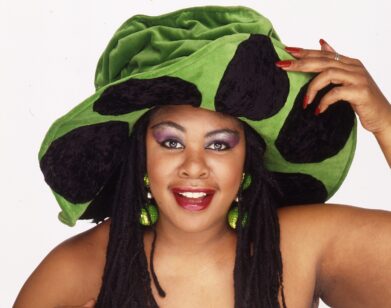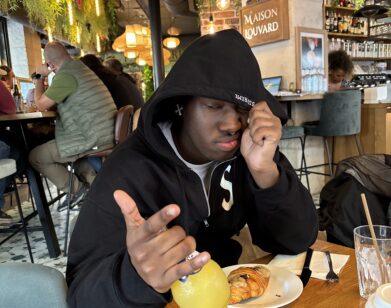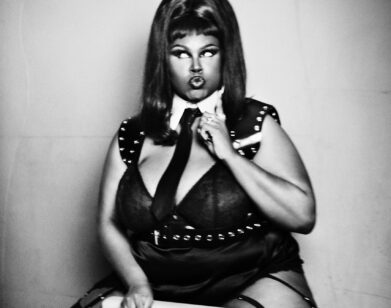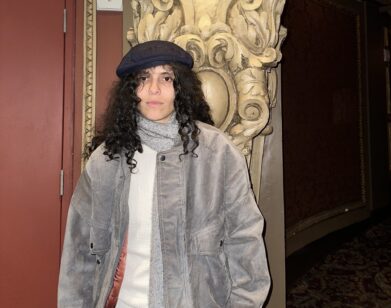SBTRKT’s Production Notes
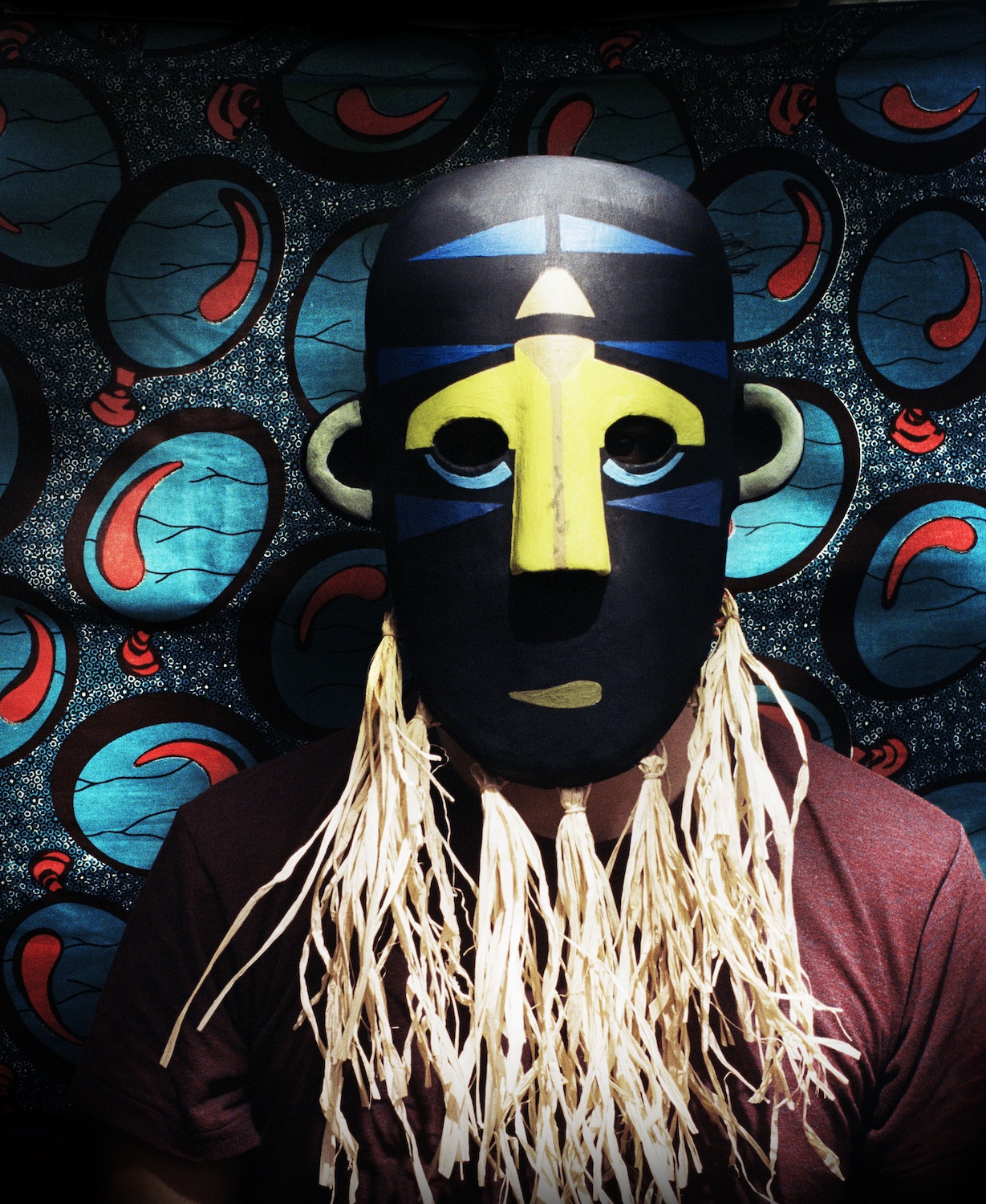
SBTRKT. PHOTO COURTESY OF DAN WILTON
In an age where practicioners of bass-booming dubstep are a dime a dozen, the challenge to stand out is greater than ever. Meet SBTRKT, a UK producer who (seemingly effortlessly) makes distinct and addictive tracks that feature the vocal stylings of Little Dragon’s Yukimi Nagano, Jessie Ware—whom you may remember from dubstep producer The Joker’s “The Vision.” Soul singer Sampha, acts as SBTRKT’s partner-in-crime throughout his self-titled debut disc. For those less indie-inclined, you may be pleased to hear that rap’s resident emo kid Drake recently recorded an unofficial verse on SBTRKT’s “Wildfire,” grabbing the attention of hip-hop fans and blog browsers alike. But however you come across the very versatile SBTRKT, one thing’s for sure: the London native is a star on the rise, with talent for days and a sound all his own. We spoke to the producer about his anonymity, creative choices, and his strange new music video.
ALEX CHAPMAN: I was curious why you chose to keep yourself rather anonymous in the press. Is that strategy or a natural inclination?
SBTRKT: It’s something that I felt was the right thing to do, in terms of making music. It’s just about letting people hear it and then deciding for themselves whether they want to find out more and discover it for themselves. Everything stems from that.
CHAPMAN: Do you find that people want to know more about you now that they know you don’t want them to know more about you?
SBTRKT: I think yeah, it’s always natural, especially with the Internet—you can Google anything these days. But I try to shy away from that in interviews and let the music sell itself.
CHAPMAN: You collaborate with a few vocalists on your new record. How do you choose someone to sing on a track?
SBTRKT: Generally I’m quite picky—I usually don’t approach a person unless I think we have some sort of cohesive way of working together. Little Dragon was an outsider in that bunch because I was just a mad fan of their sound and direction and what they do as artists, in terms of the way they put songs together. So to collaborate to them is just great, and it worked really well. But the majority of the album is with a vocalist called Sampha, and that’s a thing where I believe that his content lyrically and melodically fits and completely intertwines with what I do in terms of building songs. I’ve never been a fan of getting someone to sing the generic, love song lyrics and sticking on top of the feature. If I’m gonna collaborate at all, it has to be in a way that makes the track a whole and not two parts.
CHAPMAN: Do you collaborate with the singers in the creative process, or do you just let them do what they do?
SBTRKT: All of the songs have been written in my living room while I’m there—none of them have been done outside the studio, so everything is a constant collaboration through weeks and months of working. With Sampha, we’ll generally jam out tracks with synthesizers and drums and stuff, and he’ll vocalize little ideas on top of them. And I think we always agree where things should go, even lyrically.
CHAPMAN: That’s an interesting approach. I know a lot of producers who would just hand the track off—
SBTRKT: Yeah, ship out an instrumental, take it back, master it, and say, “That’s it.” For me, I’ve done that in the past—when you first start working with people, that’s generally what you do. When you’re a producer, you don’t feel comfortable trying to push a vocalist when you first start out. But for me, I like to push the boundaries of what my collaborators are comfortable with. Like Sampha—he’s got a very soulful tone, but when I meld into my sound, it’s melancholic and almost indie and emo, which is not necessarily naturally where he’d be singing otherwise. And with Jessie Ware, she’s got such a massive vocal range and can belt out a song, but I’d rather flip it—on “Right Thing To Do,” she sings totally quiet, and it works so effectively in that song.
CHAPMAN: So as someone who is big on preserving your vision and the artistry of the whole thing, which I think is great, I’m wondering what your live show is like.
SBTRKT: I try to have it be an extension of what I do in the studio. It’s kind of a natural thing to continue the live show in that way. Electronic acts are normally uninteresting to me—they make their production at home and there’s no audience there. I feel like there’s a moment with the crowd, and more DJs can have that moment with the crowd then electronic acts. But what we’re trying to do is play real instruments, but in a way that still focuses on the electronic aspect of the music. So we aren’t trying to move far away from that, but when you hit a drum or play a synthesizer or do vocals, people can see that onstage instead of it just being a load of sounds being triggered off. I’ve really enjoyed playing live shows, because sometimes things we’ll just happen—sometimes a song will go on for 10 minutes. It always depends on the crowd. But it’s always kinda different, which is cool.
CHAPMAN: What kind of places are you playing in?
SBTRKT: A majority of our live shows have been in very small venues. I remember one of the keyboards fell off the stand and hit someone on the head, because the stage and the crowed were so close. And that’s really nice, when people can get close and see absolutely everything. It’s harder to play on a bigger stage with the kind of sound we have, to be honest. It doesn’t feel as interactive—you have to have that closeness to the band to feel that. But we try different things—when we play on big stages, we tend to beef off the dance side of things and keep up the tempo.
CHAPMAN: Seems like that could get crazy.
SBTRKT: I DJ’d Friday night at a festival in Denmark, and there were 20,000 people in there, and it was just nuts. 15,000 in the tent and 10,000 outside—and that energy is just incredible. I’ve never seen an audience going that nuts all at once for a DJ. So sometimes it works perfectly.
CHAPMAN: I just saw the video for “Wildfire.” How involved are you in making your videos?
SBTRKT: I’m pretty involved. I kind of like directors to have their own vision—I never like to impress on people what I think the video should be. It’s like a remix: the person who’s doing the job has the best vision for what they’re doing. But I think the video really sums up where we were going with it—it’s like a mad Korean film. Like a horror thing. I’ve always seen the darker side of the music. That track has gotten loads of radio play and I guess people think it’s kind of happy, but for me, a lot of the meaning is quite dark and melancholy. So when I made the video, it suited exactly what I felt about the song, although may not have for other people. But those people will just think it’s weird.
SBTRKT’S SELF-TITLED DEBUT IS OUT NOW. HE IS PERFORMING LIVE WITH SAMPHA AT MOMA PS1’S THE WARM UP ON SATURDAY, JULY 9. FOR MORE INFORMATION, CLICK HERE.

